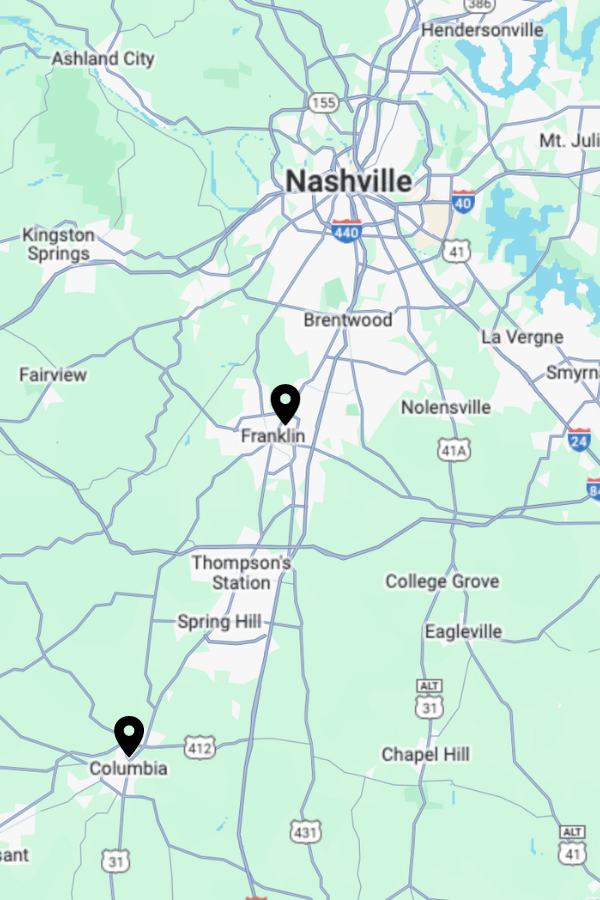Apex Recovery offers multiple non-12 step rehab programs in Tennessee. These programs cater to those seeking alternative, non-traditional approaches to addiction recovery. With a focus on personalized care and evidence-based treatments, Apex Addiction Recovery Center’s facilities in these states provide comprehensive support to help people overcome substance abuse and achieve long-term sobriety.
Apex Recovery partners with numerous health insurance providers, offering close by, in-network coverage for inpatient treatment programs. This means people seeking non 12-step rehabilitation services can utilize their insurance benefits for comprehensive care at local Apex Recovery facilities. This commitment to accessibility ensures that more people can access the non 12-step support they need on their journey to recovery.
Statistics on Non Twelve Step Addiction Programs
Non-12 step addiction treatment programs have shown encouraging outcomes compared to traditional 12-step methods, with a notable abstinence rate of 49% against the 38% of 12-step programs. These programs excel not only in helping people achieve sobriety but also in maintaining it over time, especially evident in the higher rates of sustained sobriety at the six-month follow-up.
Additionally, they offer improved results for those facing dual diagnoses of substance use and mental health disorders. Participants in 12 step alternative recovery programs report high levels of satisfaction, attributing to the quality and impact of the treatment received. These 12 step alternatives are beneficial financially, associated with lower healthcare costs and less utilization of medical services. Moreover, specific non 12-step rehab treatments like Cognitive Behavioral Therapy and SMART recovery show promising results; 60% of CBT patients had clean toxicology screens at a year follow-up, and 71% of SMART recovery participants reported reduced substance use, indicating the positive influence of non-12 step programs on long-term recovery.

Who is Non Twelve Step Substance Abuse Rehab Programs Suitable For?
Non-12-step substance abuse rehab programs offer versatile treatment options catering to a wide audience with unique recovery needs. These programs are particularly beneficial for people seeking personalized approaches outside the traditional 12-step framework, emphasizing flexibility, secular options, and comprehensive care strategies.
- Individuals with Dual Diagnosis: These programs provide integrated treatment for those dealing with substance abuse and concurrent mental health issues, ensuring both conditions are addressed simultaneously.
- Non-religious people: For those preferring a secular recovery path, non-12-step programs offer alternatives to 12 step recovery that do not require engagement with spiritual or religious principles.
- Those Seeking Evidence-Based Approaches: These programs often incorporate scientifically supported treatments like Cognitive Behavioral Therapy, offering strategies rooted in psychological research.
- People Looking for 12-step Alternative Techniques: For those who have not found success with or are not interested in traditional 12-step programs, these alternatives offer new methodologies and philosophies for recovery.
- You want to focus on family and your support systems: Non-12-step programs frequently emphasize the importance of involving family and support networks in the recovery process, facilitating healing and accountability.
- Individuals Seeking a Holistic Approach: Catering to those who value treatments addressing all aspects of well-being—physical, emotional, mental, and sometimes spiritual—holistic programs offer a comprehensive path to recovery.
Free Addiction Assessment
Schedule a free, confidential assessment with a licensed clinician. Apex Recovery can check your insurance coverage levels for drug and alcohol addiction, and mental health treatment.
Evidence-Based Non-12 Step Drug and Alcohol Rehab Programs
Evidence-based non-12 step drug rehab and non-12 step alcohol rehab programs offer a variety of approaches, utilizing proven methodologies to support recovery. These programs include Cognitive-Behavioral Therapy (CBT) based programs, Dialectical Behavior Therapy (DBT) based programs, Motivational Enhancement Therapy (MET), Mindfulness-Based Relapse Prevention (MBRP), Contingency Management (CM), and holistic programs, each designed to address addiction’s multifaceted nature through specific, targeted strategies.
Cognitive-behavioral therapy (CBT) Based Programs
Cognitive-behavioral therapy (CBT) based programs are based on the understanding that thoughts, feelings, and behaviors are interconnected. These programs help to identify and modify negative thought patterns and behaviors contributing to substance abuse. Through structured sessions with trained therapists, people learn coping skills, problem-solving techniques, and strategies to challenge and change maladaptive beliefs.
CBT helps people recognize triggers for substance use, develop healthier coping mechanisms, and build resilience against relapse. It’s an evidence-based approach proven effective in treating various mental health disorders, including addiction, by promoting long-lasting behavioral change and fostering sustainable recovery.
Dialectical Behavior Therapy (DBT) Based Programs
Dialectical Behavior Therapy (DBT) based programs integrate principles of mindfulness, acceptance, and change to address addiction and co-occurring mental health issues. Developed originally to treat borderline personality disorder, DBT emphasizes the balance between acceptance of oneself and the need for change. These programs teach skills such as emotion regulation, distress tolerance, interpersonal effectiveness, and mindfulness.
By enhancing emotional regulation and interpersonal skills, DBT helps people manage cravings, cope with stressors, and improve relationships. DBT-based programs offer a structured and supportive environment, empowering people to develop healthier coping strategies and build a life worth living, free from the grip of addiction.
Motivational Enhancement Therapy (MET)
Motivational Enhancement Therapy (MET) is a client-centered approach designed to evoke rapid, internally motivated change rather than guiding clients step-by-step through the recovery process. This method focuses on resolving ambivalence about engaging in treatment and stopping drug or alcohol use.
Through personalized feedback sessions, MET helps people explore their motivations, recognize the discrepancies between their current behaviors and personal values or goals, and strengthen their commitment to change. By emphasizing self-motivation, MET encourages people to take active roles in their non 12-step recovery journey. This approach is particularly effective in the early stages of treatment, setting a solid foundation for lasting recovery.
Mindfulness-Based Relapse Prevention (MBRP)
Mindfulness-Based Relapse Prevention (MBRP) is an innovative approach that combines traditional relapse prevention strategies with mindfulness practices to address substance use and addiction. This program teaches people how to handle discomfort and cravings through awareness and acceptance of present-moment experiences.
By cultivating mindfulness, participants learn to observe their thoughts and feelings without judgment or immediate reaction, breaking the habitual cycle of addiction. MBRP equips people with tools to recognize early warning signs of relapse, effectively manage stress, and make healthier choices. This approach promotes a deepened sense of self-awareness and control, offering a powerful strategy for maintaining sobriety and enhancing overall well-being.
Contingency Management (CM)
Contingency Management (CM) is a behaviorally-based treatment approach that utilizes positive reinforcement to encourage sobriety and adherence to treatment goals in substance use disorders. This method is grounded in the principle that behaviors followed by rewards are more likely to be repeated.
In CM programs, people receive tangible incentives, such as vouchers or small cash rewards, for demonstrating positive behaviors like attending therapy sessions or providing drug-free urine samples. These rewards increase in value with consecutive positive behaviors, reinforcing abstinence and treatment engagement. CM has been scientifically proven to be effective, particularly in treating opioid, stimulant, and tobacco use disorders, by directly linking behavioral change with immediate rewards, promoting sustained recovery efforts.
Holistic Programs
Holistic programs in addiction recovery include a comprehensive approach that seeks to heal the body, mind, and spirit. These programs integrate conventional treatment modalities with alternative therapies to address the root causes of addiction and foster overall well-being. Practices such as yoga, meditation, acupuncture, nutritional counseling, and physical fitness are common in holistic programs, alongside psychotherapy and non 12-step support groups.
The goal is to provide individuals with a range of tools and coping mechanisms that promote physical health, mental clarity, emotional balance, and spiritual growth within reach. By treating the whole person rather than just the symptoms of addiction, holistic programs empower people with the resilience and self-awareness necessary for long-term recovery and a fulfilling life.

- Please complete and send the form below.
- One of our staff members will contact your insurer to check your coverage.
- We will contact you promptly with the results and to discuss the next steps.
Insurance Verification
"*" indicates required fields
How to Find Non-12-Step Drug and Alcohol Addiction Programs Near Me
For alternative addiction treatment, explore non 12 step treatment centers in Middle Tennessee. These centers offer evidence-based therapies like CBT, DBT, and MET. For personalized guidance, contact us or call Apex Substance Addiction Recovery Center at (877) 881-2689. Our expert team can assist in finding the right program to support your recovery journey.
Free Addiction Assessment
Schedule a free, confidential assessment with a licensed clinician. Apex Recovery can check your insurance coverage levels for drug and alcohol addiction, and mental health treatment.

Non-12 Step rehab Centers in Middle Tennessee (TN)
Looking for a non-12 step recovery program? Apex Addiction Recovery Center in Tennessee serves the community with two facilities, enhancing accessibility to non-12-step rehab services. The Franklin center, and the Columbia center, both offer comprehensive, evidence-based addiction treatment tailored to your needs.
Apex Recovery Franklin
4601 Carothers Pkwy STE 250A
Franklin, TN 37067
Apex Recovery Columbia
2710 Trotwood Ave STE A & B
Columbia, TN 38401

Are There Alternative Programs and Non 12-Step Programs?
Yes, there are numerous alternative and non 12-step recovery programs available for those seeking different paths to recovery from addiction. These non 12-step alternatives often emphasize a more secular or scientific approach to addiction treatment, focusing on self-empowerment, psychological therapy, and evidence-based practices. Programs like SMART Recovery (Self-Management and Recovery Training) utilize cognitive-behavioral therapy techniques to help people manage their recovery.
Others, such as Refuge Recovery, incorporate mindfulness and meditation practices drawing from Buddhist principles. Additionally, programs like LifeRing Secular Recovery and Secular Organizations for Sobriety (SOS) offer supportive communities without reliance on a higher power concept, catering to those who prefer a non-religious framework for overcoming addiction in their non 12-step solutions.
SMART Recovery Program
SMART Recovery is a popular alternative to the traditional 12-step program offered by organizations like Alcoholics Anonymous (AA). Founded on cognitive-behavioral therapy (CBT) principles, SMART focuses on empowering people to overcome addiction through self-directed change. Participants learn practical skills to manage cravings, cope with triggers, and enhance motivation for recovery.
Unlike AA, SMART Recovery does not incorporate spiritual or religious elements, appealing to those seeking a secular approach. Meetings are structured to encourage open discussion, goal-setting, and evidence-based strategies, providing a supportive environment for people to address substance misuse and achieve long-term sobriety.
LifeRing Program
LifeRing Secular Recovery offers an alternative to the traditional 12-step programs, focusing on the power of peer support and personal growth to overcome addiction. Emphasizing the three S’s: Sobriety, Secularity, and Self-Help, LifeRing encourages people to find their own path to recovery. Participants are empowered to build personal recovery plans, rather than following a prescribed set of steps.
Meetings provide a safe, secular space for sharing experiences and strategies for maintaining sobriety. The approach is flexible, encouraging, and inclusive, appealing to those who prefer a non-religious framework for addiction recovery. LifeRing’s philosophy is that each person has the power within themselves to control their future and achieve a sober life.
Women for Sobriety
Women for Sobriety (WFS) offers a supportive alternative to traditional 12-step programs, specifically tailored to the needs of women in recovery. Founded on the New Life Program, WFS promotes self-discovery, emotional growth, and spiritual awakening as keys to sobriety. Through positivity, personal responsibility, and sisterhood, participants develop coping strategies and self-esteem, fostering empowerment and resilience.
Meetings offer a non-judgmental space for women to share experiences and support one another’s journey toward recovery. WFS emphasizes the strength and potential within each woman, helping them break free from addiction and build fulfilling, alcohol-free lives. It’s a community-driven approach that celebrates women’s unique paths to sobriety.
Moderation Management (MM)
Moderation Management (MM) offers an alternative approach to traditional abstinence-based programs like AA, focusing on helping people moderate their alcohol consumption. MM promotes self-monitoring, goal-setting, and lifestyle changes to achieve balanced drinking habits. Participants learn practical strategies to identify triggers, set limits, and manage cravings effectively.
Unlike AA, MM does not require complete abstinence and encourages people to take responsibility for their drinking behavior. Meetings provide a supportive environment for members to share experiences and receive guidance on moderation techniques. MM aims to empower people to regain control over their drinking and make healthier choices, promoting a sustainable, moderate approach to alcohol use.
Secular Organizations for Sobriety (SOS)
Secular Organizations for Sobriety (SOS) provides a supportive community for those seeking a secular alternative to the 12-step recovery model. Emphasizing self-empowerment and personal responsibility, SOS encourages members to achieve and maintain sobriety through evidence-based methods and mutual support, without reliance on a higher power.
The program focuses on the person’s inherent ability to change and overcome addiction, offering a space for sharing personal experiences and coping strategies. SOS meetings are inclusive, welcoming people of all backgrounds and beliefs who share a common goal of sobriety. By prioritizing scientific understanding and respect for diverse recovery paths, SOS caters to those looking for a non-religious approach to overcoming substance dependency.
Does Insurance Cover Non-12-Step Substance Abuse Programs?
Insurance coverage for non-12-step substance abuse programs varies depending on the person’s insurance plan and the specific treatment center. Many insurance providers offer coverage for evidence-based addiction treatment programs, including non-12-step options. However, coverage details may differ, and some plans may have limitations or require pre-authorization.
It’s advisable for people seeking non-12-step recovery treatment to contact Apex Drug and Alcohol Addiction Recovery Center directly to inquire about coverage options and financial assistance programs. Additionally, some treatment centers – like Apex Alcohol and Drug Addiction Recovery Center – offer sliding scale fees or payment plans to accommodate individuals without insurance coverage. Contact us online or call us today at (877) 881-2689. Also, check out our insurance page for an overview of coverages.
How Much Does Non 12-Step Rehab Cost?
The cost of non 12-step rehab near me can vary widely depending on factors such as the location, duration of treatment, level of care, amenities provided, and specific services offered. On average, non-12-step rehab programs may range from several thousand to tens of thousands of dollars per month.
Out-of-pocket costs can also be impacted by insurance coverage, financial assistance programs, and sliding scale fees offered by some treatment centers. It’s essential for people considering non-12-step rehab to inquire about pricing and payment options directly with Apex Substance Addiction Recovery Center, so you can get started on the right foot. If you have any questions, we can check your insurance at Apex to get going.
Is The 12-Step Addiction Recovery Program Evidence-Based?
The 12-Step addiction recovery program is considered evidence-based, supported by a substantial body of research indicating its effectiveness in helping individuals achieve and maintain sobriety. These programs operate on principles of mutual support, accountability, and the process of personal and spiritual growth.
Studies have shown that participation in 12-Step programs can significantly enhance recovery outcomes when combined with other treatments, such as counseling and medical care. The emphasis on peer support networks helps reduce feelings of isolation and promotes sustained recovery. While not universally effective for everyone, the 12-Step model has a long-standing history of success and continues to be a vital component of many people’s recovery journeys.
What are the Twelve Steps of AA?
The Twelve Steps of Alcoholics Anonymous (AA) provide a framework for overcoming addiction and behavioral issues. Developed in the 1930s for alcoholism recovery, they’ve since broadened to address various addictions. Centered on a spiritual foundation, but not tied to any religion, the steps encourage personal growth, self-reflection, accountability, and service to others.
- The first step involves acknowledging one’s inability to control their addiction and recognizing the chaos it has brought into their life.
- The second step is about believing in a higher power’s ability to restore sanity and balance.
- In the third step, people commit themselves to the guidance and care of a higher power as they understand it.
- The fourth step requires conducting a thorough and honest self-examination to identify flaws and wrongdoings.
- The fifth step is about openly admitting to oneself, a higher power, and another person the specific nature of one’s wrongs.
- Step six is the preparation to allow a higher power to remove all identified character defects.
- In the seventh step, people humbly ask their higher power to eliminate their shortcomings.
- The eighth step involves making a list of all those harmed by one’s actions and being willing to make amends to them.
- Step nine is about making direct amends to those harmed, when possible, without causing further injury.
- The tenth step continues the process of self-reflection and admission of wrongs promptly when they occur.
- In the eleventh step, people seek to enhance their spiritual connection through prayer and meditation, asking for knowledge of the higher power’s will and the strength to carry it out.
- The twelfth step is the culmination of having a spiritual awakening and committing to share this message with others suffering from addiction, while practicing these principles in all aspects of life.

Statistics on Non-12 Step Addiction Treatment Programs
- Non-12 step programs achieved abstinence rates of 49%
- 12-step programs, meanwhile, achieved abstinence rates of 38%
- People participating in non-12 step programs reported higher rates of sustained sobriety at the 6-month follow-up compared to 12-step participants
- Non-12 step treatment approaches had improved outcomes for people with co-occurring substance use and mental health disorders.
- Non-12 step programs reported high levels of satisfaction with the treatment received for substance abuse
- Non-12 step programs were associated with lower healthcare costs and reduced utilization of medical services compared to traditional 12-step programs.
- 60% of patients using CBT had clean toxicology screens at the 52-week follow-up
- 71% of SMART recovery participants reported a drop in their alcohol or drug use after meetings
- 19% of SMART recovery participants reported no change
